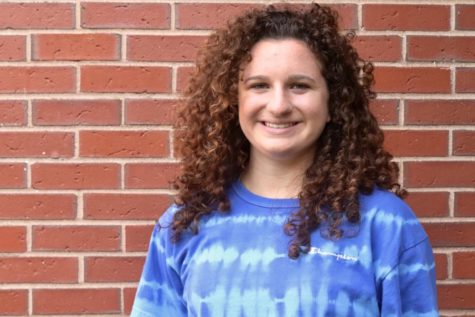Chat with Cat: Why admitting ignorance is the smartest thing you can do
Credit: Owen Smith
After an interview with college journalism professors, managing editor Caterina Tomassini explains why asking basic questions is essential to journalism
June 10, 2020
In a world where news is never-ending and stories develop at the speed of light, journalists are asked to do it all. We must be able to report on stories quickly, execute sufficient interviews, and produce updated, relevant content. The work can seem endless, but as a high school journalist, I can’t wait to dive right in.
The only issue is that sometimes, I don’t know where in the journalism world I fit in.
“I ask my students to think about where they have a presence and where they fit,” University of Texas at Austin journalism professor Kevin Robbins said. “What matters to you? What do you want to know more about?”
So, what does matter to me? I’m a junior in high school, and after three years in the journalism world, I’m still not sure.
As an incoming freshman, I wanted nothing more than to be a sports reporter. I immediately began writing articles about new football equipment and breakthrough soccer games, but honestly, I was ignorant of the sports world. I did not know nearly as much terminology as I had previously thought, and basketball was much more complicated than I had anticipated. Since I was so unknowledgeable about the sports world, I often asked basic, uninteresting questions in order to hide my lack of knowledge about the topic. My articles were often bland and only reported the basic sports updates.
When second-quarter rolled around, I made my way to the news section, where I developed daily stories and managed to schedule quick, informative interviews. Two weeks into the new position, I fell in love and was convinced that I would be news reporting for the rest of my life.
After jumping around from section to section throughout my freshman and sophomore years— writing for arts and entertainment, broadcasting for a short-lived news segment, sideline reporting at basketball games, and establishing my opinions column—I earned the position of the features editor.
I’ve always said—and will probably always say—that features is the love of my life. There is nothing I adore more than shedding light on the unknown; peoples’ unconventional hobbies, Wayland’s hidden charm, or the world’s greatest secrets. However, especially in feature writing, there is just so much to learn.
I’ve found myself in countless situations in which an awesome story idea develops about a topic of which I know nothing, like, absolutely nothing. So, naturally, I ask around, do my research, and try to get a basic understanding of the story so that the interview flows smoothly and without any awkward gaps. Yet sometimes, I still don’t know what I’m talking about.
“It’s okay to admit ignorance,” assistant professor at the school of journalism at Northeastern University Meg Heckman said. “You want to do your homework enough so that you know what you’re talking about, but it’s okay to tell the person you’re talking to that you don’t know much about some basic things [in their field].”
By admitting ignorance, I’ve learned more than ever before. After you get over the fear of saying, “I’m not sure what this means,” you come to realize that it’s okay not to know everything. In fact, you can’t know everything, especially in the world of journalism. How can I be an expert in nordic skiing, the math team, my town’s new policies, and the latest national news? As much as I try to be well-rounded, there will always be more to discover.
In any case, if a journalist already knows the answers to all the questions, what would their job be? My love for journalism stems from the idea of meeting others and indulging in what they’re passionate about. I love seeing the light on an interviewee’s face when they explain the influence of their grandmother on their life or why they love to bake cupcakes. More serious, often controversial topics like politics allow me to not only understand an interviewee on a personal level, but also how others can perceive the world. Why do people believe the things they believe? Why do specific events hold such meaning to certain people?
In pursuit of the answers to questions this large, you must first ask the questions themselves, regardless of your level of knowledge.
So, take on a story that you’re not an expert on. Try to learn something new. Discover what the world has to offer. But first, you have to admit that you are unfamiliar with the subject. By taking this small leap, interviewees will reward you with valuable information, useful quotes, and a unique perspective.
So, please, for the love of journalism, admit ignorance.





![Last Wednesday, the Wayland School Committee gathered to discuss a number of topics regarding the health curriculum and Innovation Career Pathway course. Another large topic of conversation was the ways to potentially mitigate distracting cell phone usage. "These [phones] are going to distract your learning and social relationships," Superintendent David Fleishman said. "That's concrete right there."](https://waylandstudentpress.com/wp-content/uploads/2025/06/Screenshot-2025-06-04-at-9.49.31 PM-1200x886.png)



























![Troy Hoyt finishes the Boston Marathon, running for the Hoyt Foundation. T. Hoyt is the son of Hoyt Foundation CEO Russ Hoyt.
“[Running a marathon] might seem like a big thing, when it’s presented to you at first, but if you break it up and just keep telling yourself, “Yes, you can,” you can start chipping away at it. And before you know it, you’ll be running the whole 26 miles, and you won’t even think twice about it.” T. Hoyt said.](https://waylandstudentpress.com/wp-content/uploads/2025/04/C36E8761-1CBB-452E-9DF2-543EF7B1095E_1_105_c.jpeg)














































Anon • Jun 12, 2020 at 9:05 PM
Cat!! This is an amazing article.